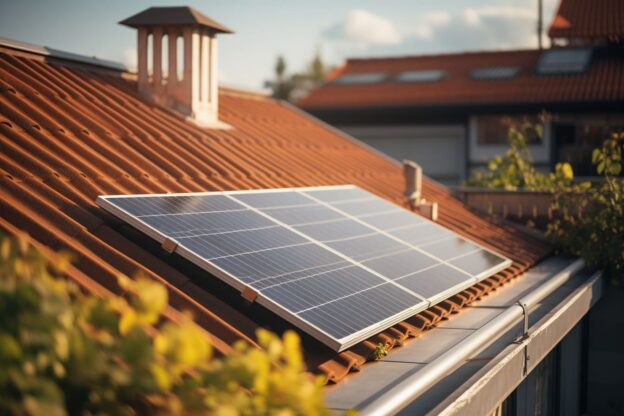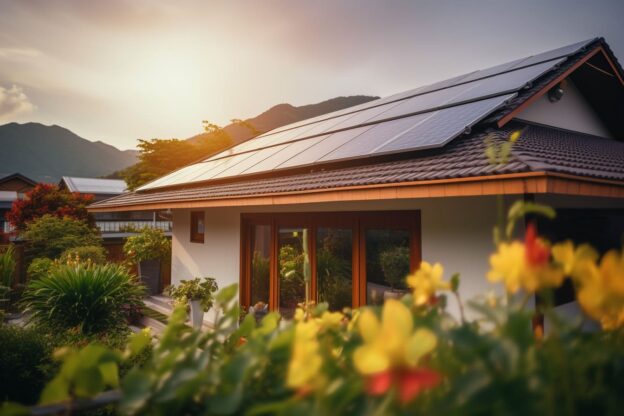Solar panel installation can seem like a daunting task, but it doesn’t have to be. With a little bit of research and planning, homeowners can easily install solar panels on their homes and start enjoying the benefits of renewable energy.
Benefits of Solar Panel Installation
Before diving into the installation process, it’s important to understand the benefits of solar panels for homeowners. Here are some of the top benefits:
- Lower energy bills: Solar panels generate electricity from the sun, which means homeowners can rely less on electricity from the grid and potentially save money on their energy bills.
- Increased home value: Solar panels can increase the resale value of a home. According to a study by the National Renewable Energy Laboratory, homes with solar panels sold for an average of 4.1% more than homes without solar panels.
- Environmental benefits: Solar panels generate clean, renewable energy, which helps reduce carbon emissions and decrease our dependence on fossil fuels.
Planning for Solar Panel Installation
Before installing solar panels, homeowners should consider the following factors:
- Roof orientation and shading: Solar panels are most effective when they are installed on a south-facing roof with minimal shading from trees, buildings, or other obstructions.
- Roof condition: The roof should be in good condition and able to support the weight of the solar panels. If the roof needs repairs, it’s best to do them before installing the panels.
- Local regulations and incentives: Homeowners should research any local regulations related to solar panel installation, as well as any available incentives or rebates for installing solar panels.
- Energy usage: Homeowners should have a good understanding of their energy usage to determine how many solar panels they need to install. They can calculate their energy usage by looking at their utility bills or by using an online calculator.
Choosing the Right Solar Panels
There are many types of solar panels on the market, and homeowners should choose the right ones for their needs. Here are some factors to consider:
- Efficiency: The efficiency of a solar panel refers to how much electricity it can generate from a given amount of sunlight. Higher efficiency panels may be more expensive, but they can generate more electricity in less space.
- Cost: Solar panels can vary widely in cost, so homeowners should determine their budget and find panels that fit within it.
- Warranty: Homeowners should look for solar panels with a good warranty to protect their investment. Most solar panels come with a 25-year warranty, but it’s important to read the fine print to understand what is covered.
The Installation Process
Once homeowners have chosen the right solar panels and done their research, it’s time to start the installation process. Here are the general steps:
- Site assessment: A solar installer will assess the site to determine the best location for the solar panels and the necessary equipment.
- Permitting: The installer will obtain any necessary permits from the local government.
- Roof preparation: The installer will prepare the roof by installing mounting brackets and sealing any holes or gaps.
- Panel installation: The solar panels will be installed on the mounting brackets.
- Electrical work: The installer will connect the solar panels to an inverter, which will convert the DC electricity generated by the panels into AC electricity that can be used in the home.
- Inspection: The installation will be inspected by the local government to ensure that it meets safety and building codes.
Conclusion
Solar panel installation can be a great investment for homeowners who want to save money on energy bills and reduce their carbon footprint. By understanding the planning process, choosing the right solar panels, and working with a reputable installer, homeowners can successfully install solar panels on their homes and enjoy the benefits of renewable energy.
It’s important to note that while solar panel installation can be a DIY project, it’s recommended that homeowners work with a professional solar installer. A professional installer can ensure that the solar panels are installed correctly and safely, and can handle any necessary permits or inspections.
In summary, solar panel installation is a great investment for homeowners who want to save money on energy bills and reduce their impact on the environment. By understanding the planning process, choosing the right solar panels, and working with a professional installer, homeowners can successfully install solar panels on their homes and start enjoying the benefits of renewable energy.


